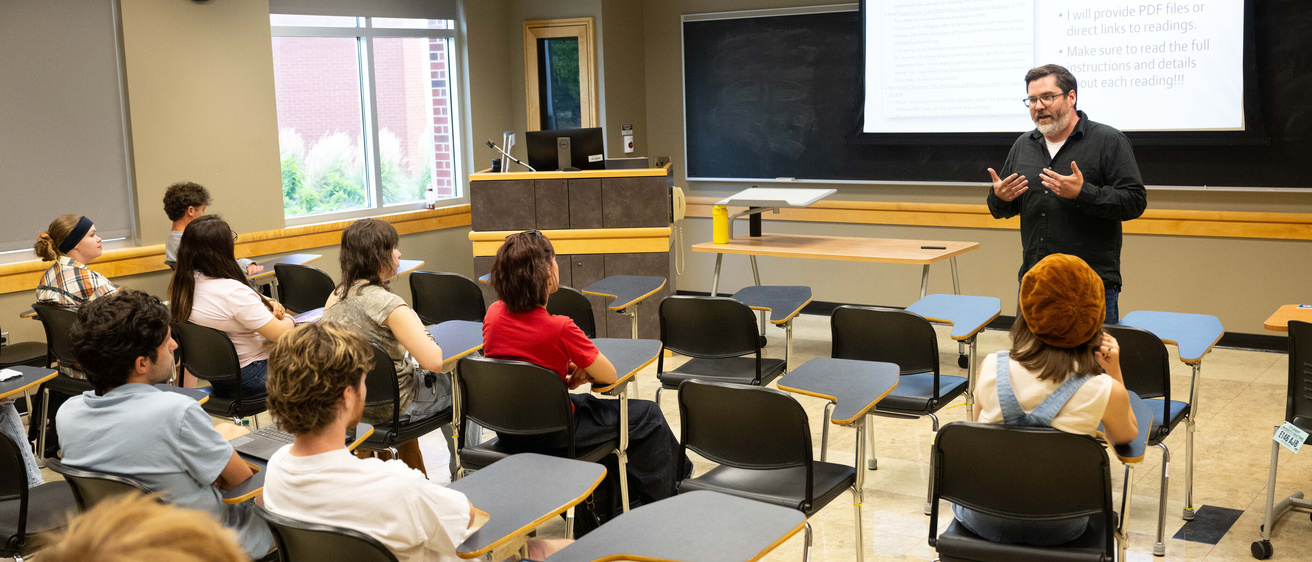Making digital course materials accessible can feel like a daunting task, but the university’s Course Accessible for Everyone training—or CAFÉ for short—makes the experience feel more like a piece of cake.
CAFÉ training was established to specifically address accessibility in ICON courses. It was created by dr. eden jones, an instructional accessibility consultant in the Office of Teaching, Learning, and Technology, who discovered that instructors needed accessibility training focused on digital course materials.
Instructors at the University of Iowa are part of the state and local government entities working to comply with a new federal rule requiring all forms of digital content—including online course materials—to be accessible to people with disabilities by April 24.
Looking to examples at peer institutions like Northwestern’s Mission: Accessible program, jones developed a training that would provide instructors with the tools and confidence they needed to make their digital course content accessible for all students.
CAFÉ training is a 90-minute training session that teaches seven core principles of digital accessibility. The training is available in live, virtually led trainings, or on-demand in a guided ICON course called CAFÉ To Go.
CAFÉ training focuses on seven themes related to common accessibility hurdles:
- ensuring headings are easily navigable,
- using links that are meaningful and understandable,
- including row and column headers on tables,
- making pages easier to read by using lists,
- ensuring adequate color contrast,
- providing alternative text for all images,
- including transcripts for video and audio materials.
These core principles of digital accessibility empower instructors with the knowledge they need to make their content accessible for all Hawkeyes.
CAFÉ training also teaches instructors how to utilize tools like Anthology Ally and TidyUP, which uncover potential accessibility issues on ICON sites.
Ally scans the materials in ICON courses and gives pointers to improve accessibility. TidyUP is a file cleanup tool built into ICON courses. It will scan an ICON site so instructors can quickly assess which files they want to keep, and which can be deleted.
In the fall 2025 semester, 1,129 instructors have used the instructor feedback tool in Ally 38,677 times, altering 24,536 items. The average improvement in file accessibility is 72%.
“University of Iowa instructors are embracing the training and tools to make their courses accessible to everyone,” says Maggie Jesse, executive director of the Office of Teaching, Learning, and Technology and co-chair of the Accessibility Task Force. “They want to do the right thing, and our goal is to make accessibility as easy as possible for them. We want to make accessibility checks a habit for everyone, like using spell check.”
Graduates of the CAFÉ training course are certified CAFÉ Baristas, empowered to apply their knowledge to their ICON courses and other digital content, like course documents and personal websites. Instructors must earn a 94% or better Ally score on one of their ICON courses to become certified. To date, 140 instructors and staff have completed the training and nearly 300 have attended training on digital accessibility.
Dr. Carly Armour, graduate student success administrator in the Department of Community and Behavioral Health, is the program’s first certified CAFÉ Barista.
“The easy-to-follow, comprehensive CAFÉ training was really beneficial,” Armour says. “It not only refreshed my accessibility skills but also taught me new ones to remove barriers.”
While the technical know-how is key to tackling digital accessibility, another goal of CAFÉ is to support instructors who may feel overwhelmed or worried that digital accessibility will be challenging to accommodate. jones recognizes these concerns and offers words of reassurance:
“This is an ultra-marathon, not a sprint; nobody is expecting you to sit down for a couple hours this weekend and take your course to 100% accessible. It's a long process of learning and applying that knowledge slowly, surely, and systematically,” jones says. “I like to remind folks of the old adage: How do you eat an elephant? One bite at a time.”
Getting started with digital accessibility can be intimidating. But, instead of facing the big picture all at once, jones recommends tackling course accessibility in small, manageable bites.
“Think of it like this: you've got 10 minutes left in your drop-in hours, no students are here and all your emails are answered. You could spend that 10 minutes a number of ways, but why not pop open next week's PowerPoint presentations and run the Accessibility Checker really quickly? Just taking small steps like that in the small windows of opportunity that we find can make a difference,” jones says.
If you’re looking to take the first few bites out of course accessibility, CAFÉ training is a perfect place to start. Visit the Office of Teaching, Learning, and Technology website for more on live trainings and CAFÉ To Go. Upcoming trainings that support the creaton of accessible content:
- Anthology Ally is a tool to create accessible content in ICON courses: noon to 1 p.m., Jan. 6
- Course Accessibility For Everyone (CAFÉ) Full Blend: 8:30 to 9:30 a.m., Jan. 12
- Tools and tips for remediating and creating accessible PDFs: noon to 1 p.m., Jan. 15
